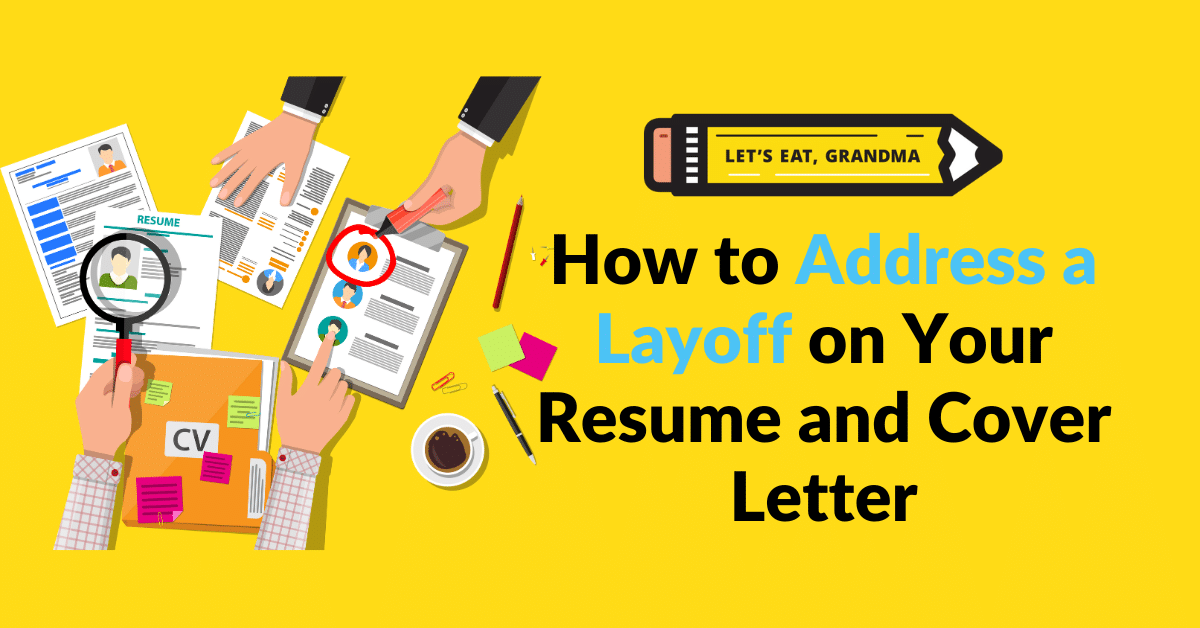How to Address a Layoff on Your Resume and Cover Letter

Getting laid off stinks. Fortunately, you’re not the only one this has happened to, and your situation is completely understandable. Here’s how to address your layoff on your resume and cover letter.
Editor’s note: This post was originally published in 2020; it has been updated for accuracy and comprehensiveness.
By: Matt Dupee, CPRW | Contributor for Let’s Eat, Grandma
As we all know, a lot of people have been laid off in the past few years, which means they’re now faced with the question of how to address that layoff in their resume and cover letter.
The COVID-19 pandemic that began in 2020 caused a significant disruption in many industries worldwide, leading to a large number of layoffs. Many businesses were forced to close or reduce their operations due to lockdowns and social distancing measures, resulting in decreased revenue and financial losses.
As a result, companies were forced to make tough decisions to cut costs, and many chose to lay off employees.
The uncertain job landscape has continued to the present day, and it feels like every morning there’s news of another layoff.
If you’ve been laid off, try to take some comfort in knowing this doesn’t have to be a major obstacle to getting a new job.
Due to the current employment landscape, I can guarantee hiring managers will understand your circumstances if you were laid off.
A prospective employer will generally understand that being laid off is often not an employee’s fault and can happen due to various reasons such as economic downturns, company restructuring, or changes in business priorities. They know being laid off does not necessarily reflect poorly on an employee’s performance or abilities.
Ready for more job search help?
Sign up for a free Senior Writer Resume Critique to see what's holding you back from landing interviews. One of our top professional resume writers will give you personalized feedback on the top 3 items you can improve based on our expert practices!
Let’s Eat, Grandma is here to support you every step of the way in your job search journey. Sign up for a free Senior Writer Resume Critique to see what’s holding you back from landing interviews. One of our top professional resume writers will give you personalized feedback on the items you can improve based on our expert practices!

Photo by LinkedIn Sales Solutions on Unsplash
How do I address a layoff on my resume?
The short answer is DON’T.
There is no need to include any mention of or explanation for a layoff in the text of your resume. Your cover letter is another story, but we’ll get to that in the next section.
In fact, if you worked for the job for a short time and don’t feel like you have any significant achievements to highlight from your time there, you could choose to leave it off altogether. Employers are much more understanding of career gaps these days as well.
That said, if you have concrete, measurable accomplishments in the role, such as hitting sales targets, streamlining processes, or increasing customer satisfaction, include it, even if you only held the job for a short time.
It may feel really awkward to start your resume with a short job, but including it will provide a comprehensive and accurate picture of your work experience and employment history.
Just like in your other job entries, highlight results using metrics (numbers speak volumes) and keep everything positive.
But remember, the resume is not the place to mention a layoff – doing so takes up valuable real estate for listing your accomplishments and skills.
Where to address a layoff
OK, so you now know not to address your layoff in your resume. What about the cover letter?
As your chance to explain details from your career story that are not in your resume, your cover letter is the ideal place to explain any layoffs.
This is your best opportunity to eliminate any potential confusion around a short position by briefly explaining the circumstances around your departure.
Some job seekers can get away with not mentioning that they were laid off at all, or they could wait until the interview. It’s important to consider that a TON of competent employees have been laid off in the past few years. If you think an employer will have questions after looking at your resume, it’s now easier than ever to prove with just a sentence or two that your layoff wasn’t due to your performance but the health of the company.

Photo by Christina @ wocintechchat.com on Unsplash
How to address a layoff in the cover letter
If you decide to address a layoff in your cover letter, follow these three tips:
1. Make it short
You don’t need to go into extensive detail about the circumstances of your layoff. A few sentences is enough to acknowledge the situation and move on.
2. Keep it positive
Even if you are still holding a grudge against your employer, you don’t want to dwell on the negative or make excuses.
3. Look to the future
Use the layoff as an opportunity to showcase your resilience and determination. Explain how you’ve used the experience to grow and develop new skills, and how you’re ready for new challenges.
Then, just move on. No need to highlight the layoff any more than you have to. Simply answer the question “What happened?” and let it be.
Here’s another example of how you could address a layoff in your cover letter:
I was recently laid off from my position at XYZ company due to a company-wide restructuring. While the experience was difficult, I’ve used the time since then to reflect on my skills and career goals. I’m excited to bring my expertise in [relevant skills] to a new role, and I’m confident that my [relevant accomplishments] make me a strong candidate for this position.
Here’s an example our founder Chris wrote for a client in the service industry:
Recently, Landry’s Inc. announced a round of layoffs due to the COVID-19 crisis, and my position was eliminated. I was consistently rated as a top performer at my restaurant, and I plan on delivering that same level of service in my next position.
After acknowledging the layoff, shift the focus to your skills, experience, and what you can offer the company. Emphasize your accomplishments in previous roles, and highlight how you can contribute to the company’s goals.
The bottom line
Unfortunately, being laid off is a common occurrence in the job market, and as long as you approach the situation with a positive attitude, honesty, and confidence in your abilities, you’ll be able to adapt and overcome any challenges that may come your way, and ultimately achieve success in your career.
It’s important to remember that setbacks, such as being laid off, are often opportunities for growth and development. By demonstrating resilience and a willingness to learn from the experience, you can show prospective employers that you are a valuable asset to their team.
Ready for more job search help?
Sign up for a free Senior Writer Resume Critique to see what’s holding you back from landing interviews. One of our top professional resume writers will give you personalized feedback on the top 3 items you can improve based on our expert practices!
